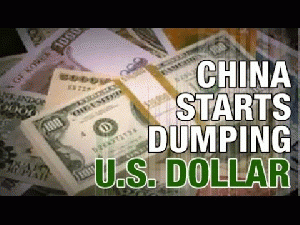Cross-posted from Dispatches From The Edge
The recent round of sanctions aimed at Moscow over the crisis in the Ukraine could backfire on Washington by accelerating a move away from the dollar as the world's reserve currency. While in the short run American actions against Russia's oil and gas industry will inflict economic pain on Moscow, in the long run the U.S. may lose some of its control over international finance.
Proposals to move away from using the dollar as the international currency reserve are by no means new. Back in 2009, the Shanghai Cooperation Organization (SCO) proposed doing exactly that. SCO members are Russia, China, Kazakhstan, Kyrgyzstan, Tajikistan, and Uzbekistan. Afghanistan Iran, India, Pakistan and Mongolia have SCO observer status, and the organization has close ties with Turkey and the Association of Southeast Asian Nations.
Ever since the 1944 Britton Wood Agreement, the world's finances have been dominated by the U.S. dollar, the International Monetary Fund (IMF), and the World Bank. But, according to economist Jeffrey Sachs, that world is vanishing and the dollar cannot continue to hold the high ground, because "the role of the United States in the global economy is diminishing."
While it may be diminishing, the U.S. and its European allies still control the levers of international finance. For example, the U.S.' slice of the global GDP is 19.2 percent, and its share of IMF voting rights is 16.8 percent. In contrast, China, with 16.1 percent of the global GDP, has only 3.8 percent voting rights in the IMF. The presidency of the organization is reserved for a European.
In 2010, the World Bank "reformed" its voting rights to increase low and middle-income countries from 34.67 percent to 38.38 percent, although even this modest adjustment has been sidelined because the U.S. Senate refuses to accept it. The wealthier countries still control more than 60 percent of the vote. The presidency of the Bank normally goes to an American.
In early August of this year, the BRICS countries -- Brazil, China, India, Russia and South Africa -- launched a series of initiatives aimed at altering the current structure of international finance. Besides pushing to dethrone the dollar as the world's reserve currency, the organization created a development bank and a Contingent Reserve Arrangement (CRA). The former would allow countries to by-pass the IMF and the World Bank, with their tightfisted austerity fixation, and the latter would give countries emergency access to foreign currency.
The development bank will start off with $50 billion in the kitty, but that will soon double. The BRICS will also be able to draw on $100 billion from the CRA. While by international standards those are modest sums -- the IMF has close to $800 billion in its coffers -- the BRICS bank and CRA has just five members, while the IMF serves hundreds of countries. Eventually the BRICS observer members may be able to tap into those funds.
Last month's sanctions went straight for Russia's jugular vein: the development of its massive oil and gas reserves and Moscow's construction of the South Stream pipeline. When completed, South Stream will supply Europe with 15 percent of its natural gas and generate over $20 billion in annual profits. Indeed, there is suspicion among some Europeans that the real goal of the sanctions is to derail South Stream and replace it with U.S. shale-based American oil and gas.
Sanctions can do enormous damage.
The United Nations estimates that the sanctions against Iraq were responsible for the deaths of some 500,000 Iraqi children from 1991 to 1998.
The sanctions aimed at Iran's oil and gas industry have cut deeply into government revenues -- 80 percent of the country's foreign reserves are generated by hydrocarbons -- resulting in widespread inflation, unemployment and a serious national health crisis. While humanitarian goods are not embargoed, their cost has put medical care beyond the reach of many Iranians.
Associated Press reporter Nasser Karimi wrote last year that some medicine and medical equipment costs have risen 200 percent: "radiology film up 240 percent; helium for MRIs up 667 percent; filters for kidney dialysis up 325 percent." The cost of chemotherapy has almost tripled.
Iran's exclusion from the Society for World Wide Banking (SWIFT) makes it impossible to transfer funds electronically. That, in turn, makes buying the raw materials to manufacture generic medicines expensive and difficult.
The recent crash of an Iranian passenger plane that killed 39 people was, in part, the result of sanctions. Because Iran cannot purchase spare parts for its Boeing and Airbus planes, it is forced to use alternatives, like the trouble-prone Ukrainian-made A-140 aircraft that went down Aug. 10. Another A-140 crashed in 2002, killing 46 passengers.
In short, opposing the U.S. and its allies can be dangerous to one's health.
(Note: You can view every article as one long page if you sign up as an Advocate Member, or higher).






